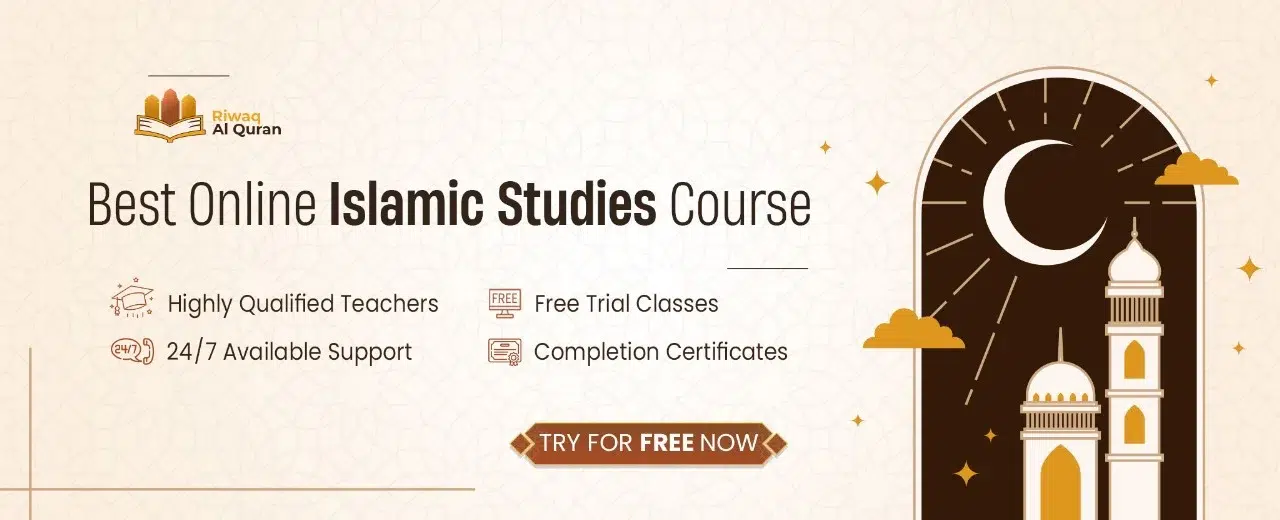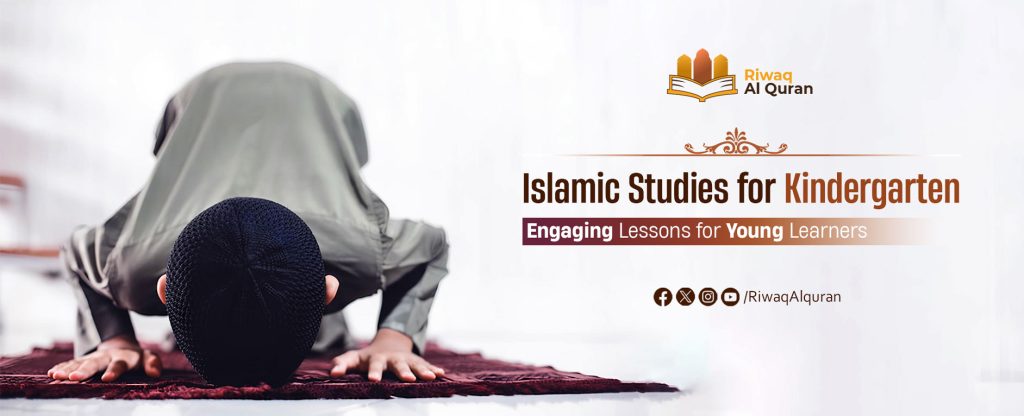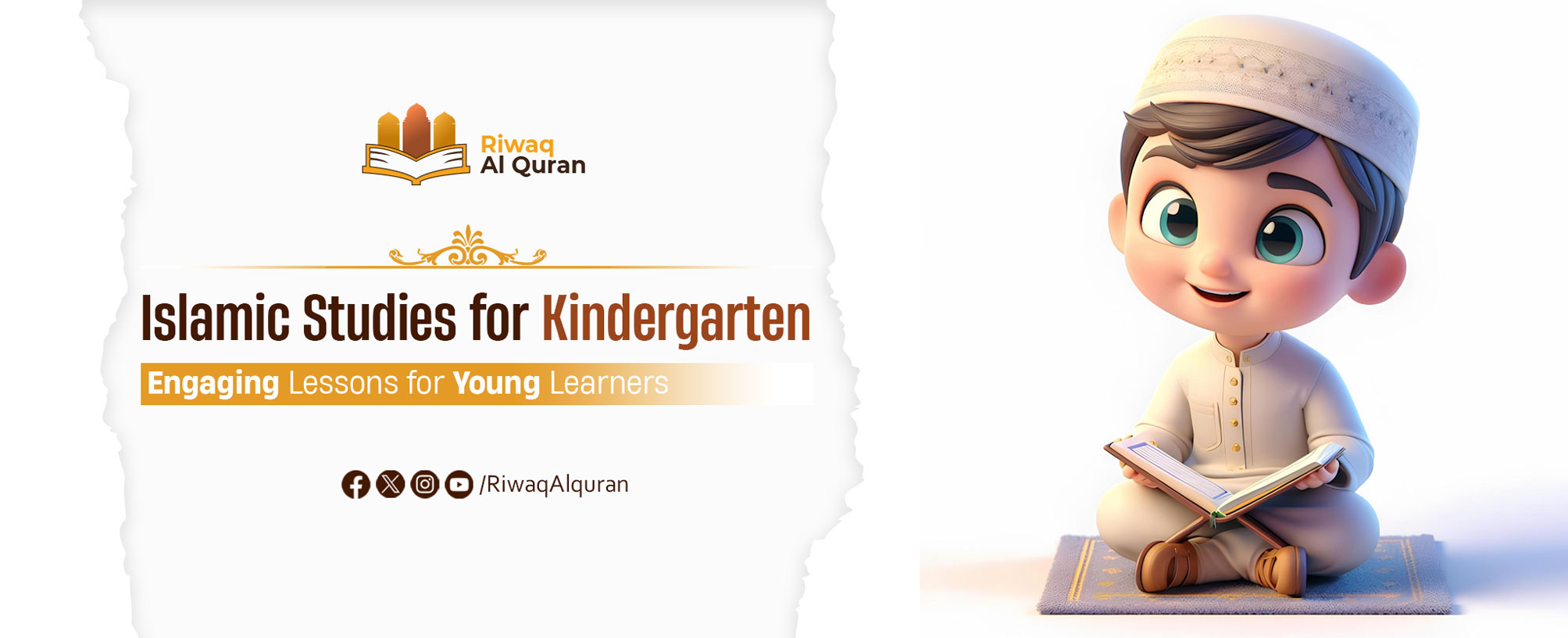As children embark on their educational journey, laying a solid foundation in their faith is essential. Islamic studies for kindergarten offer young learners the opportunity to explore and understand their religion in a way that is both engaging and age-appropriate.
This early introduction to Islamic principles not only shapes their spiritual growth but also instills values that guide their behavior and interactions throughout life. Let’s now explore the importance of Islamic studies for young children, key components of effective programs, and the benefits of online learning options, such as those offered by Riwaq Al Quran.
Table of Contents
What is Islamic Studies for Kindergarten?
Islamic Studies for Kindergarten is a structured educational program designed to introduce young children to the foundational principles of Islam. These programs aim to nurture a child’s spiritual and moral development in an engaging and age-appropriate manner.
Through stories, interactive activities, and simple lessons, children are taught core Islamic beliefs, values such as kindness and honesty, and basic practices like prayer and charity. The goal is to foster a love for Islam, build a strong faith foundation, and shape positive character traits, preparing children for lifelong spiritual growth.
Why Islamic Studies Matter for Young Children?
Introducing Islamic studies at the kindergarten level builds a strong foundation for a child’s spiritual and moral growth, helping them understand their faith and core values from an early age for several reasons:
1. Early Foundation in Faith
The early years are formative for children. Introducing them to Islamic teachings helps them build a strong foundation in their faith. It shapes their understanding of core beliefs, rituals, and values, setting the stage for a lifelong commitment to their faith. We, at Riwaq Al Quran, properly introduce Islamic teachings at this crucial stage to help build a strong foundation in their faith from a young age.
2. Instilling Core Values
Islamic studies for kindergarten focus on teaching children fundamental values such as honesty, kindness, respect, and empathy. These values are integral to the Islamic way of life and help in developing positive character traits in children.
3. Encouraging Love for the Quran
A significant aspect of Islamic education is fostering a love for the Quran. At the kindergarten level, Riwaq Al Quran uses simple and engaging methods—such as stories, songs, and basic recitations—to help children appreciate the Quran’s teachings. This approach makes learning about the Quran enjoyable and meaningful, instilling a deep connection with the sacred text from an early age.
4. Understanding Islamic Rituals
Children learn about essential Islamic practices such as prayer, fasting, and charity in a way that is easy for them to grasp. This practical knowledge helps them understand and participate in religious rituals meaningfully.
5. Building a Sense of Community
Islamic studies at this stage help children feel connected to their faith community. Learning about the life of Prophet Muhammad and the history of Islam gives them a sense of belonging and identity.


Key Components of Islamic Studies for Kindergarten
Introducing Islamic studies at the kindergarten level provides children with a valuable foundation in their faith. These early lessons play a crucial role in shaping their understanding of Islam and instilling values that will guide them throughout their lives. Here are the key components of Islamic studies for young learners:
1. Foundational Beliefs
At the kindergarten level, children are introduced to the basic tenets of Islam, including the belief in one God, the Prophets, and the Quran. This foundational knowledge helps them understand the essence of their faith.
2. Interactive Learning
Young children benefit from interactive and engaging learning methods. Islamic studies programs often include storytelling, games, and visual aids to make learning about Islam fun and memorable.
3. Moral and Ethical Lessons
Lessons on good manners and ethical behavior are a core component. Teaching children about respect, honesty, and kindness helps them develop a strong moral compass guided by Islamic values.
4. Introduction to the Quran and Hadith
Children are introduced to the Quran and Hadith through simplified stories and teachings. This approach helps them appreciate the significance of these texts without overwhelming them.
5. Cultural and Historical Awareness
Understanding the life of Prophet Muhammad and significant events in Islamic history helps children connect with their heritage and learn about the diverse aspects of their religion.
6. Practical Islamic Practices
Children learn about essential Islamic practices such as prayer (Salah), fasting, and charity (Zakat) in a way that is tailored to their age. Practical lessons include basic instructions on how to perform these rituals and their significance. This hands-on approach helps children understand and participate in these practices meaningfully.
7. Encouraging Spiritual Reflection
Islamic studies for kindergarten also introduce the concept of spiritual reflection. Children are encouraged to think about their relationship with Allah and to develop a sense of mindfulness in their daily actions. This early emphasis on spirituality helps cultivate a deeper connection to their faith.
8. Social and Emotional Learning
Integrating social and emotional learning into Islamic studies helps children navigate their interactions with others. Lessons on empathy, cooperation, and handling emotions are combined with Islamic teachings to support holistic development. This approach ensures that children not only grow spiritually but also socially and emotionally.

Benefits of Online Islamic Studies Programs
With the advancement of technology, online Islamic studies programs, like the one Riwaq Al Quran offers, have become a popular option for many parents. These programs offer several advantages:
1. Accessibility and Convenience
Online programs allow children to learn from the comfort of their own homes, eliminating the need for travel and accommodating families with busy schedules. This accessibility is especially beneficial for those living in remote or underserved areas where traditional Islamic education options may be limited. The convenience of online learning ensures that children can engage with their studies without the constraints of geographic or logistical challenges.
2. Engaging Content
Many online Islamic studies programs leverage multimedia resources such as videos, animations, and interactive lessons to capture children’s attention and make learning more engaging. These dynamic content formats help to simplify complex concepts and present them in a way that is both educational and entertaining. By incorporating various forms of media, online programs can cater to different learning styles and keep children motivated throughout their educational journey.
3. Personalized Learning
Online courses often provide personalized learning pathways, enabling children to progress at their own pace and receive instruction tailored to their individual needs and interests. Riwaq Al Quran’s online Islamic studies program allows students to spend more time on areas where they may need additional support while advancing more quickly through subjects they grasp easily.
By offering customized educational experiences, Our institute ensures that each child’s unique learning style and abilities are addressed, making the learning process more effective and engaging.
4. Qualified Instructors
Online Islamic studies programs typically feature experienced instructors who specialize in teaching Islamic studies to young learners. Riwaq Al Quran’s online Islamic studies program features experienced instructors who specialize in teaching Islamic studies to young learners, ensuring that children receive accurate, age-appropriate instruction.
The instructors’ experience in engaging with young students helps create a supportive and effective learning environment, fostering a deeper understanding of Islamic principles and practices.
5. Flexible Scheduling
One of the significant benefits of online Islamic studies programs is the flexibility in scheduling. Riwaq Al Quran’s program allows parents and children to choose times that best fit their individual routines and commitments.
This flexibility ensures that families can integrate Islamic education seamlessly into their daily lives, accommodating extracurricular activities and family time while maintaining consistent learning progress. By offering adaptable scheduling options, Riwaq Al Quran supports a balanced approach to education that aligns with each family’s unique needs.
6. Safe Learning Environment
Online programs provide a controlled and safe learning environment where children can explore Islamic teachings without distractions. The virtual classroom setting allows for focused, uninterrupted learning, and parents can monitor their child’s progress and interactions easily. This safe environment supports a more effective and secure educational experience.
7. Progress Tracking and Reporting
Many online Islamic studies programs offer tools for tracking and reporting student progress. These features allow parents to monitor their child’s achievements, areas of improvement, and overall engagement with the course material. Regular updates and reports provide valuable insights into the child’s learning journey, helping parents stay informed and involved.
8. Interactive Community
Online Islamic studies programs often include interactive features that enable students to connect with peers and instructors. Discussion forums, group activities, and collaborative projects foster a sense of community and encourage social interaction among students. This interaction enhances the learning experience by allowing children to share their thoughts, ask questions, and learn from each other.


Start Your Child’s Islamic Education Journey Today!
Unlock a world of learning and faith for your child with Riwaq Al Quran’s Online Islamic Studies for Kids Course. Our comprehensive and engaging program offers a unique opportunity for young learners to deepen their understanding of Islam and develop a strong foundation in their faith.
By enrolling your child today, you’re giving them the chance to explore Islamic teachings in an interactive and supportive environment. Don’t miss out on this chance to enrich their spiritual journey and educational growth. Enroll now and set them on the path to a meaningful and inspired life.
We offer several courses such as:
- Online courses for kids.
- Online Quran classes for kids and adults.
- Online Arabic courses
- Online Ijazah courses
- Online Islamic Studies courses.
Here are a sample of our set of Quran Courses that will be helpful for you:
- Online Tafseer Course: Delve into Quranic meanings with our insightful online Tafseer course.
- Noorani Qaida Online: Learn Quranic basics efficiently through our Noorani Qaida online program.
- Online Quran Recitation Course: Enhance Quranic recitation skills through our expert-led online course.
- Online Tajweed Classes: Master Tajweed rules for beautiful Quranic recitation in online classes.
- Quran Memorization Online Course: Memorize the Quran effectively with our specialized online memorization course.
- Online Qirat Course: Explore diverse Qirat styles with our comprehensive online Qirat course.
Online Quran Classes for Kids: Nurture a love for the Quran in kids through interactive online classes.
Conclusion
Islamic studies for kindergarten play a vital role in shaping young minds and instilling a strong foundation in faith. By introducing children to Islamic principles, values, and practices at an early age, we set them on a path of spiritual growth and ethical development.
Whether through traditional classroom settings or online programs like Riwaq Al Quran, providing children with quality Islamic education helps them build a meaningful connection with their faith and prepares them for a lifetime of learning and growth.


































